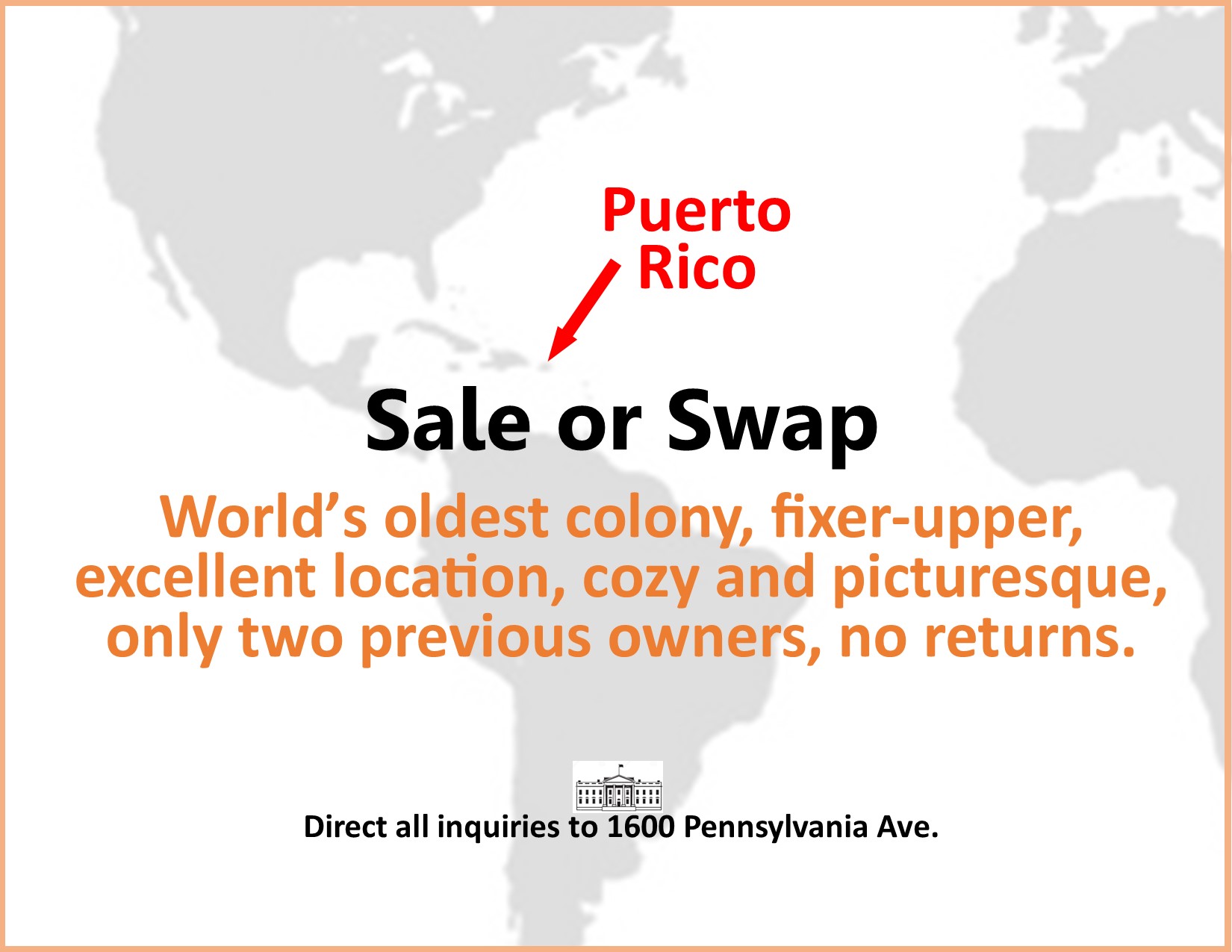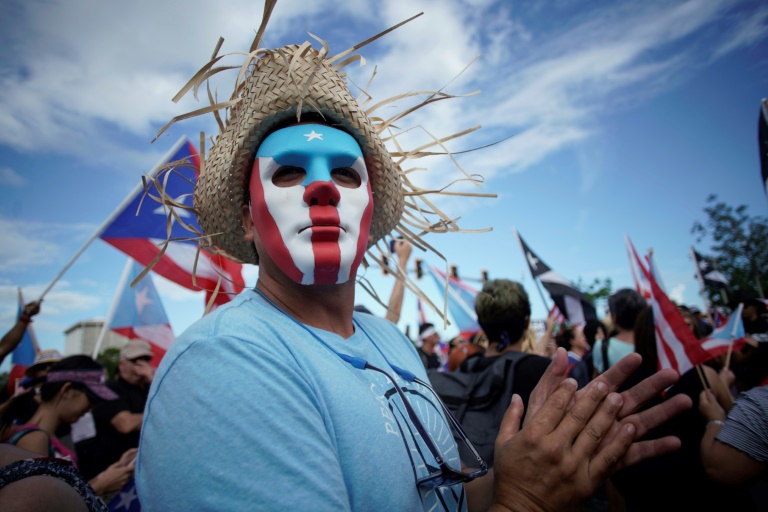This past weekend, The New York Times reported that Donald Trump had suggested to then-Homeland Security Secretary Elaine Duke that the United States sell Puerto Rico after it was struck and severely damaged by Hurricane Maria in the fall of 2017.
Months later, according to other news reports, the real-estate-mogul-turned-president wanted to purchase Greenland from Denmark and possibly swap it for Puerto Rico. Perhaps not a bad deal: 836,330 square miles with only 56,081 inhabitants in exchange for 3,515 square miles overflowing with 3.2 million people.

There is precedent for such lob-sided territorial trades. Back in 1763, at the end of the French and Indian War, a defeated France agreed to yield sovereignty over French Canada in exchange for Britain’s devolution of the Caribbean colonies of Guadeloupe and Martinique.
In 1867, Secretary of State William H. Seward purchased Alaska from Russia at two cents an acre. A parallel attempt to obtain the Danish Virgin Islands failed that year, but 50 years later, the United States acquired all three of them at $292 per acre.
But wait! We are not in the 1700s, 1800s, or even 1900s. Colonies are no longer bought and sold.
André Breton, not even in his worst surrealist trance, could have conceived a Puerto Rico-for-Greenland swap in what seems like a mad-capped game of a crossbreed of Monopoly and Risk.
Puerto Rico: World’s Oldest Colony
In 1997, the eve of the centennial of the so-called Spanish-American War, former Puerto Rico Supreme Court Justice José Trías Monge published Puerto Rico: The Trials of the Oldest Colony in the World.
Spanish conquistadores led by Juan Ponce de León colonized the island in 1508; it remained a Spanish colony long after all other American Spanish territories – except Cuba – gained independence in the 1820s and 1830s. On July 25, 1898, US military forces disembarked in Puerto Rico and after a few skirmishes took control of the island, turning it a few months later into a formal US colonial domain.
120 years ago today (July 25th, 1898) Puerto Rico was invaded and made a colony of the United States.
Puerto Ricans are US citizens. But they STILL don’t have the right to vote federally, nor do have voting rep in Congress (unless they move). Nor are they a sovereign people.
— Alexandria Ocasio-Cortez (@AOC) July 25, 2018
When Trías Monge’s book came out, Puerto Rico had endured 489 years of colonial rule. Nearly a quarter of a century later, it is still the world’s oldest colony, only older.
Even before 1898, Puerto Rican politicians were divided along the lines of political status preference: independence, complete integration to the Metropolis (Spain, later the United States), or a hybrid accommodation, securing a degree of self-rule while remaining under the sovereignty of another nation.
In 2020, the island’s politicians and their partisans are still split along the same lines, with each of the three main political parties anchored around a particular status option: the pro-US statehood New Progressive Party, the Popular Democratic Party which advocates for the continuation and/or enhancement of the current Commonwealth status, and the Puerto Rican Independence Party.
From Sad Case to Economic Development Miracle
Having grown and lived in a suburban middle-class family during what many consider Puerto Rico’s best years ever (1970s through mid-1980s), I still find it difficult to write and teach about the island’s history during the first four decades of the 20th century, when it was as neglected and impoverished as most of the rest of the Caribbean.
In a 1928 article titled The Sad Case of Puerto Rico, future Puerto Rican governor Luis Muñoz Marín wrote lyrically about an island that languished under US colonial rule: “a sweatshop that has a company store – the United States,” with “many more schools for their hungry children and many more roads for their bare feet.”
Another insular governor, New Dealer Rexford Guy Tugwell, gave a similarly somber title to his Puerto Rico years memoir: The Stricken Land, a catalog of squalor and pestilence, bitter realities he combated in alliance with Muñoz Marín, then president of the island’s Senate.
Under the leadership of progressive insular and continental elected and administrative officials, and with generous funding for the island’s New Deal letter soup – PRERA (Puerto Rico Emergency Relief Administration), PRRA (Puerto Rico Recovery Administration), WPA (Works Progress Administration), among other programs – the island gradually convalesced out of its severe depression.

Insular authorities took bold steps to improve and transform the economy, breaking up large estates measuring more than 500 acres to distribute small plots among landless peasants, establishing and running factories to produce carton, glass, ceramic tiles, cement and shoes, clearing slums, electrifying rural areas, luring US corporate capital, and building adequate public housing for the tens of thousands migrating to urban centers.
Statistics can lie but can also tell the truth. Between 1940 and 1970 life expectancy increased from 40 to 70 years; the rate of deaths attributable to parasites and infectious diseases dropped from 60 percent in 1940 to little over 12 percent in 1966; and enrolment at the University of Puerto Rico’s main campus (Río Piedras) skyrocketed from just over 5,000 in 1940 to almost 27,000 in 1970. I entered that university in 1978 and received an education that rivals that of any leading US university.
Politically, the decade and a half that followed 1940 expanded the electorate, drastically reduced political corruption, and saw a considerable increase in insular self-rule through the provisions of the Commonwealth Constitution of 1952.
To be truthful, it was not a complete paradise; more and more Puerto Ricans died of cardiovascular diseases, the use of drugs proliferated, hundreds of thousands were pushed out to the United States mainland, and radical separatists endured persecution at the hands of the state.
The 16 Plagues of Puerto Rico
Ten plagues struck Old-Testament Egypt; much smaller Puerto Rico has suffered a few more.
Since 2006, Puerto Rico has endured a profound crisis, arguably deeper and harder to solve than the one of the Great Depression. Most local politicians lack the imagination and moral rectitude to confront current challenges, and Trump, to put it in the kindest terms possible, is not Franklin D. Roosevelt.
The deepest and longest-lasting plagues are endemic and date back over 500 years: (1) colonialism and (2) dependency. Not only is Puerto Rico still a colony, but over the past decade, congressional legislation and Supreme Court decisions have actually reversed the movement toward expanded autonomy. The island government can no longer implement annual budgets without the approval of a Junta imposed by Congress.
Long dependent on food imports for its survival, in the last three decades, Puerto Rico has undergone a demanufacturation process (plague 3). Virtually everything has to be imported; there is not much external trade except for people: temporary imports of US tourists and permanent or semi-permanent exports of residents to US cities, from Boston to Miami and all the way to California. The island’s economy has been in recession (4) since 2005.
A related plague is the island’s depopulation (5). According to the US Census, population peaked around 2000 at 3.8 million; its has fallen ever since to an estimated 3.2 in 2020, a reduction that has severely eroded the tax base and home values. Polls and surveys attest to the fact that those who leave are scaping the plagues of lack of opportunities (6), frozen wages (7), and rising crime (8).
Another seemingly unbeatable plague is the island’s $74 billion debt (9), deemed unrepayable by hapless Governor Alejandro García Padilla in July 2015. Widely considered the worst Puerto Rican governor ever, he seemed to concur, not seeking re-election in 2016. That was a short-lived distinction. His successor, baby-faced and self-absorbed Governor Ricardo Roselló was forced to resign in disgrace in July 2019. Governmental ineptitude and corruption are plagues 10 and 11.
Even nature has conspired to sink the island deeper into poverty and despair. Maria, one of the island’s most devastating and deadliest hurricanes (12) ever, left in its wake of 3,369 dead and $90 billion in damages. Earthquakes (13) are not common in Puerto Rico, but since December 2019, the island has been rocked continuously by tremors and earthquakes, the strongest of which reached a magnitude of 6.4.
In June, Puerto Rico was covered by Sahara dust (14), the worst storm of its kind in 50 years.
Half-man made and half natural disaster, recurrent droughts (15) have plagued the island for decades. The drought of 2015 was the worst in 20 years. This summer’s drought has forced authorities to ration water service (24 hours with and 24 without).
Oh! Did I forget to mention 16, the COVID-19 pandemic?
Sell or Swap
By definition, as a colony Puerto Rico does not govern itself. Ultimate decisions about the island’s present and future are in the hands of the US Congress which retains the authority to incorporate the island as a co-sovereign state of the Union, as it did with Alaska and Hawaii in 1959; renouncing sovereignty by granting it independence as Portugal did with Angola, reluctantly so, in 1975; or transferring it to another nation, as Great Britain did with Hong Kong in 1997.
My list of “nevers” is shrinking daily, but for the time being, I feel comfortable saying that the United States will not sell or swap its beleaguered colony, and its citizens will retain the dubious honor of being the world’s oldest colonial subjects.
Disclaimer: The views and opinions expressed here are those of the author and do not necessarily reflect the editorial position of The Globe Post.






















